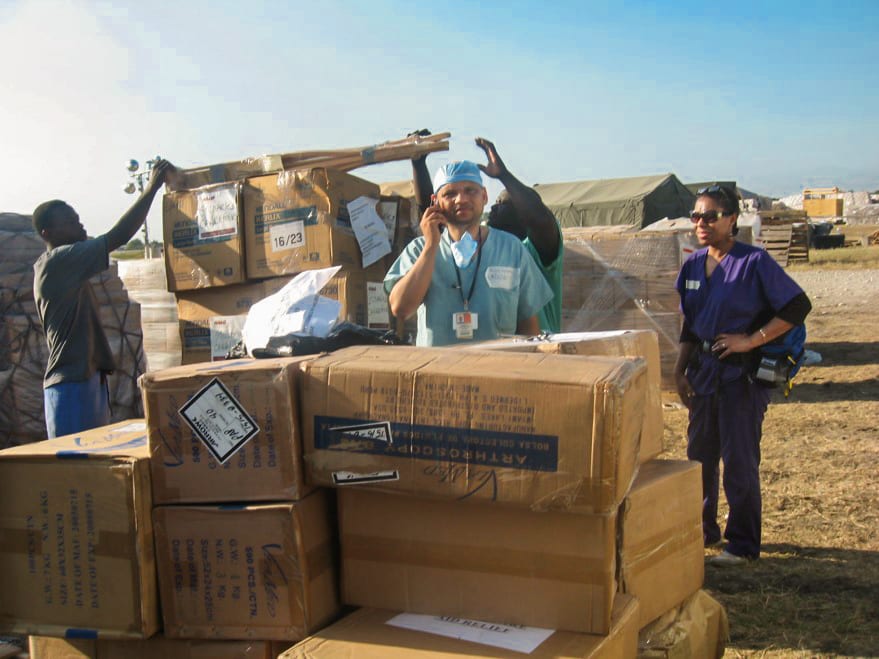Former HALO President
A magnitude 7.0 earthquake struck Haiti on the afternoon of January 12, 2010. This natural disaster was yet another severe blow to a country that was already suffering from bad fortune on many levels.
With approximately 3 million people affected, this earthquake was the most devastating natural disaster ever experienced in Haiti, the poorest country in the Western Hemisphere. Roughly 250,000 lives were lost, and 300,000 people were injured.
After I (Dr. Angelo Gousse) heard of this horrible news, I felt that it was not enough to send money to Haiti – I wanted to travel to help. When I asked my wife for her support to allow me to travel to a disaster zone, she replied she wanted to travel also in order to offer her services to the people of Haiti.
My wife and I, both the University of Miami Hospital and Clinics Employees traveled to Haiti to be part of the post-earthquake medical relief efforts. My wife Marie May is a pharmacist, and I am a urologist. We joined the University of Miami /Medishare group and left for Haiti on Saturday, January 16, 2010, four days after the earthquake. We both left with the hope that we could be useful to our injured brothers and sisters suffering from post-earthquake physical trauma. We traveled via Opa Locka Executive Airport on a small 12-passenger jet. It is my understanding that the jet service was donated by a benefactor of Dr. Barth Green’s foundation. Dr. Herold Merisier (President of AMHE – South Florida) and Dr. Michel Dodard also helped coordinate our trip.
Upon our arrival at the international airport of Haiti, we were greeted by UM/Medishare staff and driven via a pickup truck to the UM/Medishare camp. The camp consisted of two large tents previously used for UN military operations. Medical staff slept in sleeping bags on the floor or behind the tent on chairs/boxes etc.
We carried with us a sleeping bag, bottles of water, Ritz crackers, canned tuna fish, dried raisins, and hand sanitizer
We worked at the UM camp near the airport from Saturday, Jan 16th to Monday, Jan 18th and performed many urologic procedures.
Marie-May organized Pharmacy supplies. She labeled and classified the medications according to class and usage upon arrival. She also organized the dressing supplies. Afterward, she was made responsible for the camp pharmacy by Dr. Ginzburg (UM chief of operations).
Experience # 2
On Monday, January 18th, 2010, Dr. Reginald Pereira – a Haitian-born UMHC critical care physician who was returning to Florida after his heroic service at the Hospital De la Communaute Haitienne A staff member from Freres hospital came to pick us up via a pickup truck.
We had 2 or 3 teams of American-trained orthopedic surgeons and anesthesiologists performing most of the orthopedic procedures. I started 3 wound care teams led by nurses and assistants to change the dressings of all the hospitalized patients inside the hospital and the nearby hospital tents on a regular basis.
Marie-May started a Main Pharmacy Supply center on the second floor of the hospital (HVH – Freres) which supplied the newly created satellite pharmacy close to the ICU and pre-op area. She recruited a squad of young Haitian volunteer “runners” who brought supplies, medications, and dressings from the main pharmacy to the satellite.
Finally, we started instituting physical therapy and evaluation for DVT in our patient population.
Hospital Freres accommodated us very well. Throughout the day, the administrative staff provided water, tuna fish, sardines, canned food, and bread to the medical staff. They provided sleeping arrangements at some nearby private homes. The families which hosted the medical staff provided a hot dinner at night.
On Wednesday, January 20th, at around 6 a.m., after we worked all night, we were awakened by a magnitude 6.1 earthquake aftershock. By the time we ran back to the hospital, virtually all the patients had “self-evacuated” the premises from fear of being injured again. Relatives carried patients in their hospital beds to the front streets. I could not believe that it had taken less than 30 minutes to evacuate so many amputated patients.
On the afternoon of Wednesday, January 20th, we went back to the UM site to help. There we noticed that medical delivery was much better organized.
We are grateful for the opportunity to serve our countrymen in such difficult times. We thank all who made our trip to Haiti possible so soon after the earthquake. More about Dr. Gousse here.
HALO CONTACT INFORMATION:
E-mail: info@halo.com
Website: www.halohaiti.org
